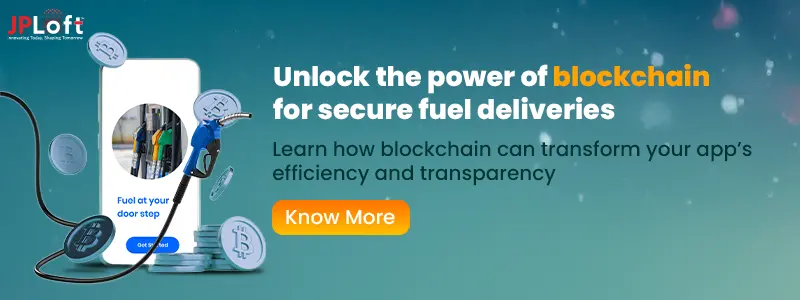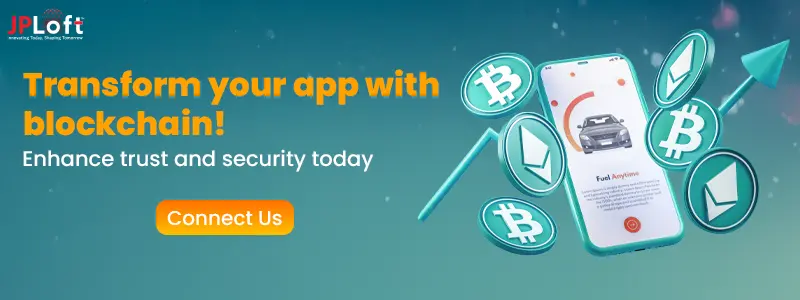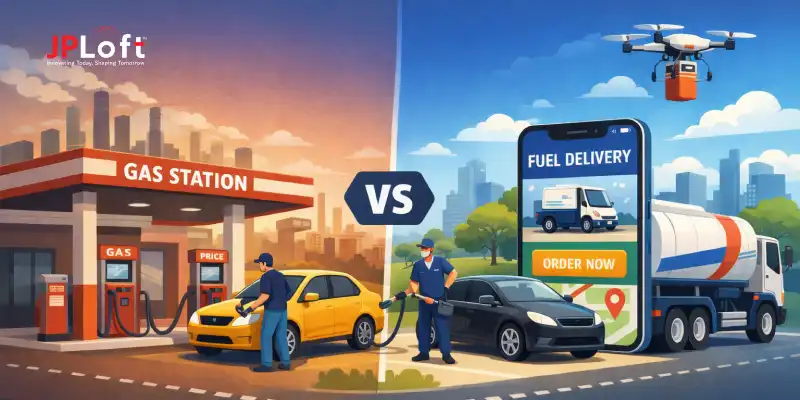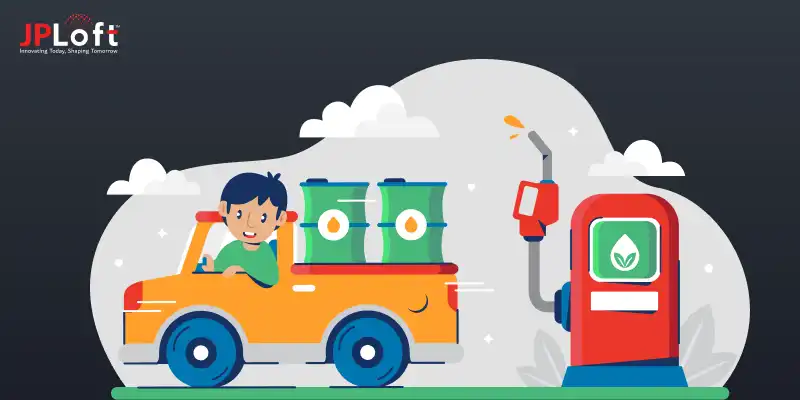In every transaction, trust is the currency. Blockchain doesn't just manage transactions; it builds an unbreakable ledger of trust.
Where trust is digitized, efficiency is maximized. That's the promise of blockchain in fuel delivery.
In this competitive industry, it is important to evaluate the different types of technologies for enhancing the performance of the app, and it's crucial for making informed decisions, enhancing career prospects, and fostering innovation.
Additionally, it's important to be trendy in this competitive market to survive in this industry. Various technologies can improve your app and enhance your sustainability in this industry.
These technologies can be artificial intelligence, AR, and VR, or blockchain that helps to reduce fraud for enhance trust among customers.
As an entrepreneur, analysing the selection and implementation of recent technologies can be difficult.
Hence, here, we will evaluate the role of blockchain in fuel delivery app, its rise in technology, reasons, challenges, and steps.
Let’s evaluate:
About Fuel Delivery- Market Stats
The fuel delivery apps are mobile applications that help users order fuel and have it delivered directly to their vehicle’s location, without visiting the gas station or any fuel station.
Let’s learn about the fuel delivery market statistics.
-
- The market size is estimated to be approximately USD 5.06 billion in 2024 and is expected to reach USD 8.75 billion by 2032, growing at a CAGR of about 7.1%.
- Based on the cognitive market research, the global on-demand fuel delivery market will be worth USD 251.2 million in the year 2024, and will expand at a compound annual growth rate of 18.20% from the year 2024 to the year 2031.
- The automotive fuel delivery system market is also projected to grow with a CAGR of 6.5%. Additionally, the fuel dispenser market is expected to grow at a CAGR of 5.74%.
- The global fuel delivery system market size was valued at USD 2.7 billion in the year 2023 and is poised to grow from USD 2.84 billion to USD 4.22 billion by 2032, growing at a CAGR of 5.1% during the forecasted period of 2025 to 2032.
Now, as you are ready to create a fuel delivery app, it's important to know the use and implementation of advanced technologies such as blockchain.
Let’s cover it all in the following sections.
The Rise of Blockchain as a Technology
The blockchain technology that is initially known for cryptocurrencies has evolved into a transformational force across diversified industries.
In short, blockchain started as a way to timestamp digital documents in 1991 to prevent tampering.
The real breakthrough came in 2008-2009 when Satoshi Nakamoto used it to create Bitcoin, a decentralized digital currency, removing the need for banks.
Then, in 2015, Ethereum expanded blockchain's use with "smart contracts," allowing for automated agreements. Since then, it has evolved into a foundational technology for secure and transparent digital applications across various industries. Blockchain started in 1991 with an idea for secure, timestamped digital documents.
The technology truly emerged in 2008 with Satoshi Nakamoto's Bitcoin, using blockchain as a public ledger for digital money, removing the need for banks.
Since then, it evolved beyond currency with Ethereum (2015) introducing "smart contracts" for automated agreements. Today, blockchain is used across many industries for its transparency, security, and efficiency.
The market for blockchain technology was estimated at USD 31.28 billion in the year 2024, and is projected to grow at a CAGR of 90.1% from the year 2025 to 2030.
It has a decentralized and secure nature that offers numerous benefits, including enhanced transparency, increased security, and a streamlined procedure. The nature of the blockchain eliminates the need for intermediaries, making transactions more secure and transparent.
The blockchain’s distributed nature means that no single entity controls the complete network, making it more resistant to manipulation and providing transparency. Additionally, this market is experiencing significant growth, with projections representing a substantial increase in value.
It is an advanced database mechanism that allows for transparent information sharing within the business network.
Later, the implementation of blockchain has assisted many industries to evolve and ensure transparency.
Blockchain implementation is among the recent fuel delivery app trends that can affect all the transactions that are recorded on a secure, tamper-proof ledger.
Well, when it comes to a fuel delivery app, it's essential to allow peer-to-peer trading of renewable energy, letting consumers and producers exchange surplus power directly, bypassing the need for traditional intermediaries.
The blockchain will unlock growth and propel strategic growth in the oil and gas industry by simplifying the operations, increasing transparency, and streamlining the overall supply chain mechanism.
Let’s learn more about the use of blockchain in fuel delivery in the section below.
Reasons to Include Blockchain in Fuel Delivery App
What are the crucial reasons for including blockchain in the fuel delivery app?
Let’s learn them all below.
1. Enhanced Transparency and Traceability
The blockchain enhances transparency and traceability by creating a secure, shared, and immutable record of transactions.
Here, the blockchain provides real-time visibility into the supply chain operations, improves traceability, and proves the provenance of products throughout the supply chain.
2. Increased Security and Fraud Prevention
The blockchain enhances security and fraud prevention through immutability, transparency, and decentralization, creating a secure and trustworthy record of transactions.
This helps prevent fuel theft, unauthorized usage, and data falsification, ensuring that fuel is delivered to the correct, verified vehicles and drivers.
3. Automation and Efficiency with Smart Contracts
Smart contracts are self-executing agreements whose terms are directly written into code on the blockchain. This has combined with the smart contracts, which can dramatically improve automation and efficiency in different applications by eliminating intermediaries and automation processes.
In the fuel delivery app, smart contracts can automate various processes, such as triggering payments automatically once a delivery is confirmed and managing inventory levels.
4. Improved Data Integrity and Trust
Blockchain ensures that all data related to fuel quality, quantity, and delivery status is accurate and verifiable.
This immutability builds a high level of trust among all participants in the ecosystem, as they can rely on the integrity of the information being shared.
5. Cost Reduction
By streamlining processes, reducing paperwork, eliminating the need for intermediaries in certain transactions, and minimizing fraud, blockchain can lead to significant operational cost savings for fuel delivery companies.
This offers significant cost reduction opportunities through streamlining processes, reducing the requirement for intermediaries, and automating tasks.
6. Optimized Logistics and Supply Chain Management
Blockchain, often combined with IoT (Internet of Things) devices and AI, can provide real-time tracking of vehicles and fuel levels, enabling dynamic route optimization.
This can lead to reduced delivery times, lower fuel consumption, and more efficient allocation of resources.
If you are confused about how this technology delivers security, then connecting with the leading blockchain development services can be helpful.
After understanding the role of blockchain in fuel delivery, let’s understand the steps to adopt it in the given section.
Process to Adopt Blockchain in Fuel Delivery App
What are the steps to adopt the blockchain in the fuel delivery app?
Let’s learn them all below.
Step 1: Identify the Need and Scope of the App
You should identify the desired need and scope of the app. This will be helpful in clearly defining the problem the app aims to resolve and in identifying the type of value to the users.
Without understanding the core features and the users' demands in the market, you cannot proceed with the app. Here you can identify the pain points and solve them via your app.
Step 2: Select the Right Blockchain Platforms
When you want to implement the blockchain in a fuel delivery app, it's important to consider the project’s needs, such as scalability, smart contract support, community, and security.
Popular platforms include Ethereum for smart contracts and dApps, Hyperledger Fabric for enterprise solutions, and Cardano for environmental and research-focused projects.
Step 3: Design the Solution Architecture
Now, it's time to design the solution architecture for implementing blockchain in the fuel delivery app. This approach integrates the blockchain and can be helpful to track performance, ratings, and delivery history, ensuring smooth and efficient service.
Under this step, you should be able to opt for the solution and methods to address the issues in transparency and security in the fuel delivery app.
Step 4: Integrate the Technology
It's time here to integrate the blockchain technology into your fuel delivery app. Include smart contracts and hire dedicated developers to implement blockchain in the app.
Here, it's essential to use a suitable case, select a blockchain platform, design the architecture, and develop smart contracts.
Step 5: Onboard Stakeholders and Train
Now, it's time to onboard the stakeholders and train them to use blockchain technology in the fuel delivery app. This step is all about training the stakeholders and involves ongoing support to facilitate their successful integration and collaboration.
Here, you should train the stakeholders related to the use of blockchain technology in the fuel delivery app.
Step 6: Monitor, Maintain, and Optimize
This is the last step, but not least. Here, you should monitor the app regularly to identify the issues that can arise while implementing the blockchain technology in the fuel delivery app.
Here, you should optimize the app by adopting and implementing crucial technologies and mitigating any kind of errors.
These were certain steps to undertake while implementing blockchain technology in the fuel delivery app.
Well, there can be some challenges that you might face while implementing the blockchain. Let’s learn it all in the section below.
Challenges of Adopting Blockchain Technology
Apart from the challenges faced while developing a fuel delivery app, you can face an issue related to adopting blockchain technology.
Let's find out in this section.
1] Blockchain Interoperability
When you implement blockchain technology in the fuel delivery app, there are a large number of blockchain networks that lack interoperability. This challenge might arise from the difficulty in enabling different blockchain networks to communicate, share data, and transfer assets.
2] Security Concerns
The blockchain is loaded with security features, and concerns about data privacy persist. When you implement a new technology as blockchain, it can produce security challenges that might impact the users’ trust.
3] Technology Complexity
The technology complexity can be an issue that you might face while adding fuel delivery to the app. This challenge can increase costs, skill gaps, security vulnerabilities, and difficulties in managing and integrating systems.
4] Lack of Users’ Trust
You might face an issue related to a lack of users’ trust because implementing the blockchain technology might create an issue related to increased transparency, enhanced security, reduced costs, and improved efficiency.
5] Lack of Adoption
The blockchains are the ecosystems that require a broad adoption to work effectively. For example, track-and-trace capabilities in fuel delivery supply chains not only require an organization to adopt a blockchain network but also for its suppliers to do so as well. This can impact the overall adoption of app security.
These were some of the challenges that you can face while implementing the blockchain in fuel delivery.
Now, let's learn more about the solutions to address these blockchain implementation challenges and practices to implement the blockchain in the fuel delivery app.
Let’s learn more about the same in the section below.
Practices to Implement Blockchain in Fuel Delivery App
With the help of practices, you can identify the patterns related to improving the fuel delivery app’s performance through implementing blockchain.
Let’s discover all these practices below.
► Secure and Transparent Transactions
The blockchain enhances the security and transparency of transactions through several key features. These include immutability, decentralization, and a shared ledger, all of which contribute to a more secure and transparent system.
► Enhances the Trust of the Users
Enhancing user trust involves building a strong and reliable relationship with users through various strategies, ultimately fostering a sense of confidence and security for the fuel delivery app. Blockchain enhances transparency, and in fuel delivery, it will help ensure the user has quality fuel at a preferred time and location.
► Prioritize Data Standardization
The immutability of blockchain means "garbage in, garbage out." Establish clear standards for data input, ensuring consistency and accuracy across all participants. Well, you can implement a robust data validation mechanism, including sensors on fuel tanks, and digital meters to feed reliable information.
► Implement in Phases, Starting with Pilot Projects
When you see the blockchain implementation as a complete task, it might appear uncontrolled and like a big challenge. With the help of a pilot, you can refine this technology for addressing the unforeseen challenges and for demonstrating the tangible value.
► Integrate with Legacy Systems
It's important to plan for the seamless integration of systems with the current fuel delivery management software and accounting systems. This might comprise developing robot APIs and middleware for ensuring data flows smoothly.
► Invest in Talent Development
You can invest in talent development and specialize in the skills of the stakeholders to help users understand the adoption and use of blockchain practices in the fuel delivery networks. It demonstrates the benefits of the new systems to overcome resistance.
Well, to implement effective blockchain implementation practices for your customized fuel delivery app, you might need to connect with the talented team of experts.
Future of Blockchain in Fuel Delivery Apps
The blockchain technology holds a great future and offers enhanced security, transparency, and efficiency in transactions and supply chains.
Through leveraging decentralized ledgers, these apps can reduce fraud by streamlining payments and ensuring a safer experience for businesses and customers.
Well, to implement effective blockchain implementation practices for your customized fuel delivery app, you might need to connect with the talented team of experts. It is a technology that is improving the complete security of apps.
The use of blockchain ensures that all transactions are recorded on a secure, tamper-proof ledger. By leveraging blockchain’s decentralized and immutable ledger, fuel delivery apps can provide verifiable records of all transactions, tracking fuel origin, as well as quality, for automating the processes with smart contracts.
For the fuel delivery apps, the blockchain technology can help provide verifiable records to track the transactions and assist people in successfully booking the fuel with utmost security and transparency.
Add Blockchain in Fuel Delivery Apps With JPLoft
With JPLoft, you can create a customized pattern for implementing blockchain in a fuel delivery app.
Additionally, our team can be helpful in creating the app, selecting crucial features, and then maintaining them efficiently.
Our team is ready to help you succeed and to bring your dream app to life. We are the leading Fuel delivery app development company, which can help you with the design, research, and more.
We can help you add security and transparency to the app, along with enhancing its overall performance of the app.
Conclusion
The rapidly growing fuel delivery app market is set for a significant transformation with blockchain technology. Beyond its origins in cryptocurrency, blockchain offers unparalleled security, transparency, and operational efficiency through its decentralized and immutable ledger.
Integrating blockchain enables automated transactions via smart contracts, ensures robust data integrity, and significantly reduces fraud and operational costs. Adopting this technology involves strategic steps like defining clear use cases, selecting the right platform, and fostering collaboration.
By embracing blockchain, fuel delivery apps can build stronger user trust, optimize logistics, and propel the industry forward with enhanced reliability and accountability.
FAQs
Blockchain significantly enhances security, transparency, and operational efficiency. It uses a decentralized and immutable ledger to record all transactions, boosting trust and accountability.
Through immutability, transparency, and decentralization, blockchain creates a secure, tamper-proof record of transactions. This helps prevent fuel theft, unauthorized usage, and data falsification.
Smart contracts are self-executing agreements coded onto the blockchain. They automate processes like triggering payments upon delivery confirmation and managing inventory, improving efficiency by eliminating intermediaries.
Blockchain ensures that all data related to fuel quality, quantity, and delivery status is accurate and verifiable. Its immutability builds high trust among participants, as they can rely on the shared information's integrity.
Key steps include identifying the specific needs and scope of the app, selecting the right blockchain platform (considering scalability and security), and designing a robust solution architecture.
Challenges include blockchain interoperability issues between different networks, technology complexity requiring specialized skills, and overcoming initial lack of user and industry-wide adoption.













Share this blog